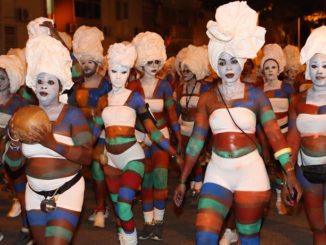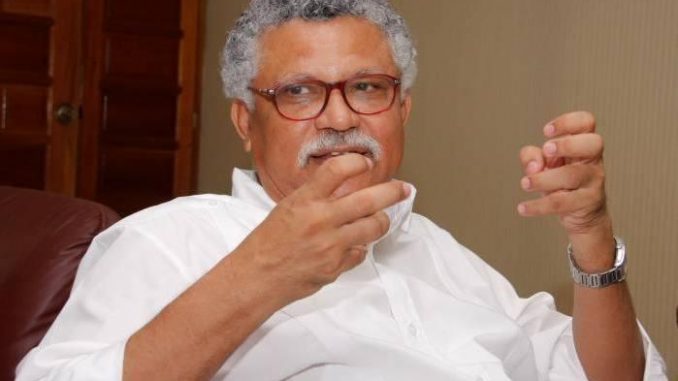
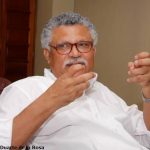 We discussed with the Carthaginian professor and diplomat Alfonso Múnera, at the moment Secretary General of the ACS* about it and other topics to know better the projects of the regional organization founded in 1994 and composed of 25 States and 11 associated territories.
We discussed with the Carthaginian professor and diplomat Alfonso Múnera, at the moment Secretary General of the ACS* about it and other topics to know better the projects of the regional organization founded in 1994 and composed of 25 States and 11 associated territories.
Indeed, the peoples of the Caribbean are still united by one of their most important cultural expressions : Carnival. The official creation of the “Caribbean Carnivals Network” (Red de Carnavales del Caribe), with the signing of eleven countries in the region, was held in July 2015 at the Fire Festival (Fiesta del Fuego), the Festival of traditional and folk cultures which takes place every year in Santiago de Cuba, a city located east of the largest archipelago of the Caribbean.
The initiative is part of the regional cooperation projects started by the Association of Caribbean States (ACS) and is created to make favourable the exchanges of experience and knowledge as well as for sharing the views and strategies on cultural policies in order to strengthen these well-known and popular festivities which are carnivals.
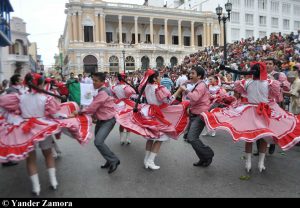 KARICULTURE.NET : The creation of this “Caribbean Carnivals Network” meets the ACS objectives subscribing for the reinforcement and enhancement of collective capacities to get a sustainable development in economy, culture, science and society. Could you tell us already, how the Association intends to increase the development of cultural ties between the members?
KARICULTURE.NET : The creation of this “Caribbean Carnivals Network” meets the ACS objectives subscribing for the reinforcement and enhancement of collective capacities to get a sustainable development in economy, culture, science and society. Could you tell us already, how the Association intends to increase the development of cultural ties between the members?
Alfonso Múnera: The Caribbean Carnivals Network (Red de Carnavales del Caribe) is one of my favorite programs because I support what many experts say : If the peoples do not begin to meet, it is very difficult to talk about unity and cooperation. This is a mechanism that claims to contribute to the construction process of a unique Caribbean identity protecting the richness of its various identities. Carnivals can also be a cultural tourist product and a legitimate and intense way of life, and we have to protect this.
The Association of Caribbean States supports this so necessary project because the mutual cooperation helps us all to improve ourselves. The best way to know ourselves and to identify ourselves is through culture. This network is ideal because among the peoples of the Caribbean peoples, carnival is the most important collective expression.
We want to do another program with several countries to create networks of researchers in order to potentiate our knowledge, so that researchers share their experiences. To go to Oxford, to Harvard or to the Sorbonne to learn what happens in the Caribbean must be an anecdote of the past from now on.
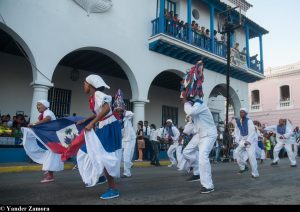 KARICULTURE.NET : Do you think the Caribbean is really visible elsewhere in the world, that we have the visibility we need?
KARICULTURE.NET : Do you think the Caribbean is really visible elsewhere in the world, that we have the visibility we need?
A. M. : The Caribbean needs to be sold as a tourist idea and this is risky because we end up creating a simplification and a kind of stereotype. As a result, abroad people see us as deliberately we sell ourselves. We have to project ourselves in all our richness and complexity. When took place the famous negotiations with the World Trade Organization, the Caribbean was the first to defend, in many ways, the idea that a differential treatment should be given to small islands and, when we did that, not only we protected ourselves but we also protected hundreds of islands in the Pacific Ocean and the Indian Ocean.
The Caribbean, in many of these negotiations, plays a leadership role and builds a common identity and expresses it. The Association’s work is to contribute to this largest unity but this cannot be thought only by governments, the common people have also to feel it. We made progress but our population has to feel that it belongs to a basin, a geographical, cultural region called the Caribbean. There is no region in the world where they speak so much about a shared identity and culture as the Caribbean. Basically, all we have the same insular loneliness so we want so much this so difficult unity to find sometimes, that means that culture is vital for us.
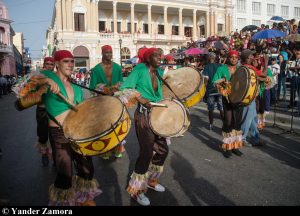 KARICULTURE.NET : For the countries in the Caribbean basin, tourism is an inescapable theme. How do they consider that common interest?
KARICULTURE.NET : For the countries in the Caribbean basin, tourism is an inescapable theme. How do they consider that common interest?
A. M. : A concept is fundamental : the tourist sustainability. We have to determine a sustainable tourism area which is already gone into force with the formal registration of 15 states of the Great Caribbean. For the moment, there are a total of 22 sites suggested by these countries which have to observe rigorous indicators to belong to this area. This is very important because the majority of Caribbean countries depend on the tourism industry and the certification of sustainability marks an advantage in the marketing of the tourist product because many people in Europe and the United States take this into account. This means a compromise with the responsible use of environmental resources.
KARICULTURE.NET : Which fields have made the most progress in terms of cooperation?
A. M. : I think the main force of the Association, at the moment, has much to do with the programs to prevent the risk of disaster that are linked to the problem that creates the climate change for these Caribbean islands.
I dare to assure that the important regional programs which are carried out, today, in the Caribbean in terms of disaster prevention, we have initiated them.
We have two fundamental programs. One of the two is called SHOCK in which participate 16 islands including Cuba and is a prevention program to reinforce the alarms in case of events such as hurricanes and tsunamis. It plans exercise, training and equipment provided by Finland, a country which has high technology in this field.
Now, we are launching a program with Mexico in which will be invested around $ 4 million to connect 11 islands to the geospatial information system of the United Nations. We also implemented other smaller programs which make stronger the association in the field of prevention.
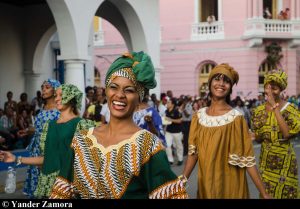 KARICULTURE.NET : How would you describe the moment that the ACS goes through ?
KARICULTURE.NET : How would you describe the moment that the ACS goes through ?
A. M. : During the last five year, we witnessed a revitalization of the Association. After several years of a certain stagnation, with the renewed commitment of Member States from 2011 and, in a very special way, that of the Haitian authorities that received in 2013 the Summit of Heads of State, some cooperation mechanisms have been reactivated. During this Summit, was adopted an action plan that ends at the end of 2015 ; beyond the selective results, it reflected the optimism according to which we work to develop the organization.
KARICULTURE.NET : What is the most complex challenge, in practice, the Association has to overcome ?
A. M. : To interconnect the Caribbean, to create transport routes. This is one of the more important problems in the islands if we want to implement what we have always dreamt of : the multidestination tourism.
This, of course, does not depend only on us or on public policy, it depends on the airline companies, on the market but we are trying to put in touch the involucrate factors. That is the hardest part.
*Since June, 2016, June Soomer is the new General Secretary of the Association of Caribbean States



